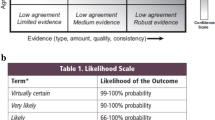Abstract
Subjective elements are an inevitable component of scientific advice on climate policies. Good practice warrants that the level of assumption underlying subjective elements be parsimonious, that their effects on policy decisions be identified, and that policy relevant variables be communicated with appropriate levels of precision. In the case of climate sensitivity, the level of precision is intrinsically difficult to quantify. There is no ‘true’ value of climate sensitivity to be discovered. Rather, best practice consists of the application of multiple methods to estimate the quantity. Best practice provides confidence that some values of climate sensitivity are more likely than others. This lends support to the notion of weighting climate sensitivity values, though the appropriate precision appears to be less than that implied by use of a probability density function (pdf) and greater than that implied by use of a simple range. Use of both a pdf and a range in this case can provide information about likely outcomes and possible extremes.
Similar content being viewed by others
References
Andronova N, Schlesinger M (2001) Objective estimation of the probability distribution for climate sensitivity. J Geophys Res 106:22, 605–22, 612
Annan J, Hargreaves J, Ohgaito R, Abe-Ouchi A, Emori S (2005) Efficiently constraining climate sensitivity with ensembles of paleoclimate simulations. SOLA 1(1):181–184
Baer P (2005) Justifying climate policy choices: new approaches to uncertainty, risk and equity. Ph.D. Thesis, University of California, Berkeley
Betz G (2007) Probabilities in climate policy advice: a critical comment. Clim Change (this issue)
Dessai S, Hulme M (2004) Does climate adaptation policy need probabilities? Clim Policy 4:107–128
Dessai S, Hulme M (2007) Assessing the robustness of adaptation decisions to climate change uncertainties: a case study on water resources management in the East of England. Global Environ Change 17(1):59–72
Forest C, Stone P, Sokolov A, Allen M, Webster, M (2002) Quantifying uncertainties in climate system properties with the use of recent climate observations. Science 295:113–117
Funtowicz S, Ravetz J (1990) Uncertainty and quality in science for policy. Kluwer, Dordrecht, (229p)
Hansen J (2005) A slippery slope: how much global warming constitutes ‘dangerous anthropogenic interference’? An editorial essay. Clim Change 68(3):269–279
Hansen J (2006) Expert report submitted to the United States District Court, District of Vermont in regard to case no. 2:05-cv-302 and 2:05-cv-304, Green Mountain Chrysler-Plymouth-Dodge-Jeep et al. v. Thomas W. Torti, Secretary of Vermont Agency of Natural Resources et al. Technical report, District of Vermont
Hansen J et al (2007) Dangerous human-made interference with climate: a GISS modelE study. Atm Chem Phys 7:2287–2312
IPCC (2006) Guidance notes for lead authors of the IPCC fourth assessment report on addressing uncertainties. Appendix in Manning 2006 Adv Cli Cha Res 2:13–21
Kandlikar M, Risbey J, Dessai S (2005) Representing and communicating deep uncertainty in climate change assessments. Comptes Rendus Geoscience 337(4):443–455
Kasting J (1998) The carbon cycle, climate, and the long-term effects of fossil fuel burning. Consequences 4(1):15–27
Kuhn T (1996) The structure of scientific revolutions, 3rd edn. Univ. Chicago Press, Chicago, p 212
Lindzen R (1990) Some coolness concerning global warming. Bull Amer Met Soc 71(3):288–299
McCarthy J, Canziani O, Leary N, Dokken D, White K (eds) (2001) Climate Change 2001: impacts, adaptation, and vulnerability. Cambridge Univ. Press, Cambridge, UK, (1032 p)
National Research Council (1979) Carbon dioxide and climate: a scientific assessment. The National Academies Press, Washington, D.C. (22 pp)
Petersen A, Janssen P, van der Sluijs J, Risbey J, Ravetz J (2003) RIVM/MNP guidance for uncertainty assessment and communication: mini-checklist & quickscan questionnaire. Technical report, RIVM/MNP. ISBN 90-6960-105-1.
Piani C, Frame D, Stainforth D, Allen M (2005) Constraints on climate change from a multi-thousand member ensemble of simulations. Geophys Res Lett 32(23):1–5
Ravetz J (1971) Scientific knowledge and its social problems. Clarendon Press, Oxford. Reprint: Transaction, New Brunswick NJ, 1996, 449 pp
Risbey J, Kandlikar M (2007) Expressions of likelihood and confidence in the IPCC uncertainty assessment process. Clim Change (in press)
Risbey J, van der Sluijs J, Kloprogge P, Ravetz J, Funtowicz S, Corral Quintana S (2005) Application of a checklist for quality assistance in environmental modelling to an energy model. Env Mod & Assessment 10(1):63–79
Risbey JS (1998) Sensitivities of water supply planning decisions to streamflow and climate scenario uncertainties. Water Policy 1(3):321–340
Risbey JS, Lamb PJ, Miller RL, Morgan MC, Roe GH (2002) Exploring the structure of regional climate scenarios by combining synoptic and dynamic guidance and GCM output. J Clim 15(9):1036–1050
Schmidt G (2006) Climate sensitivity: plus ça change. Text available at http://www.realclimate.org/
Schneider SH (1997) Laboratory earth: the planetary gamble we can’t afford to lose. Harper Collins, New York, (p 174)
Schneider SH (2002) Can we estimate the likelihood of climatic changes at 2100? Clim Change 52(4):441–451
van der Sluijs J, Craye M, Funtowicz S, Kloprogge P, Ravetz J, Risbey J (2005) Combining quantitative and qualitative measures of uncertainty in model-based environmental assessment: the NUSAP system. Risk Anal 25(2):481–492
van der Sluijs J, Eijndhoven J, Shackley S, Wynne B (1998) Anchoring devices in science for policy: the case of consensus around climate sensitivity. Soc Stud Sci 28(2):291–323
Author information
Authors and Affiliations
Corresponding author
Rights and permissions
About this article
Cite this article
Risbey, J.S. Subjective elements in climate policy advice. Climatic Change 85, 11–17 (2007). https://doi.org/10.1007/s10584-007-9314-8
Received:
Accepted:
Published:
Issue Date:
DOI: https://doi.org/10.1007/s10584-007-9314-8




